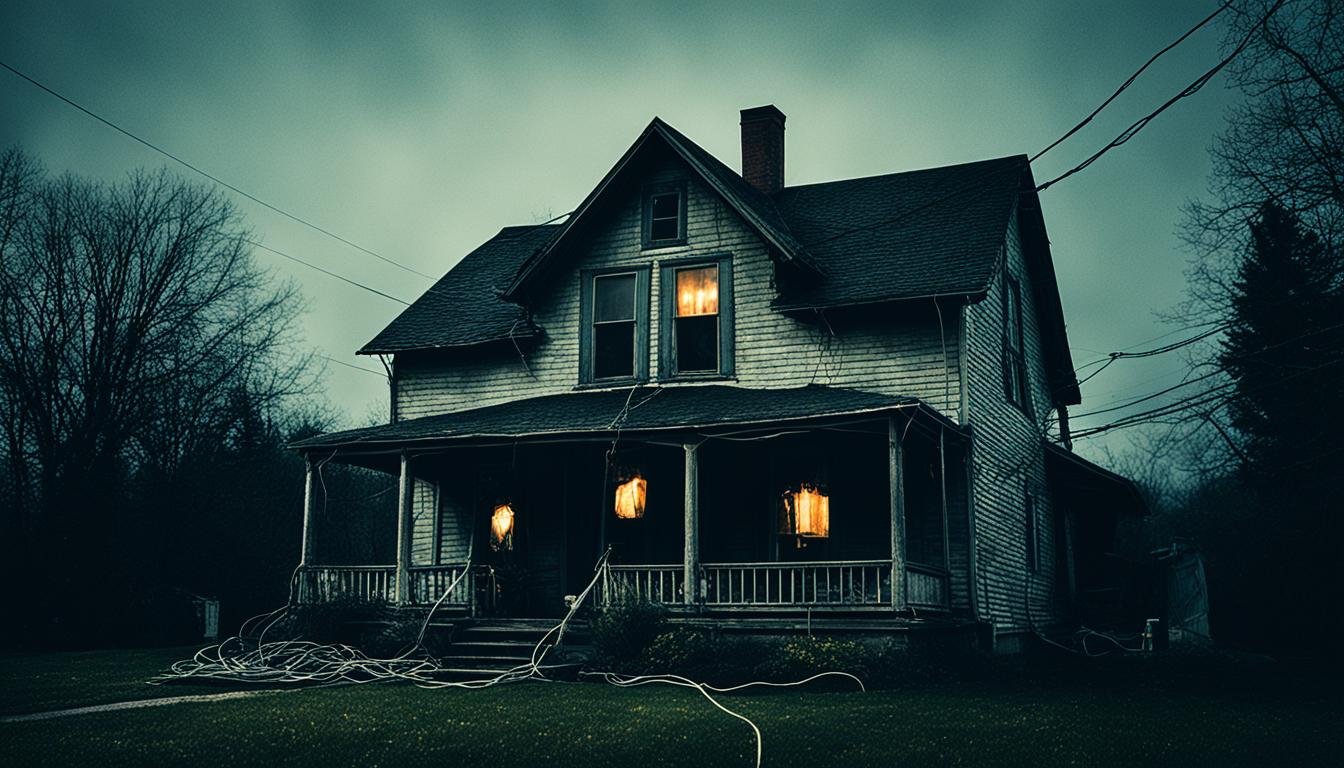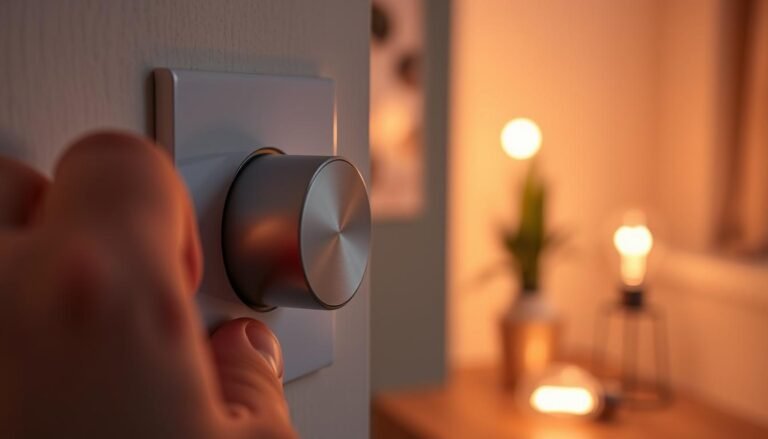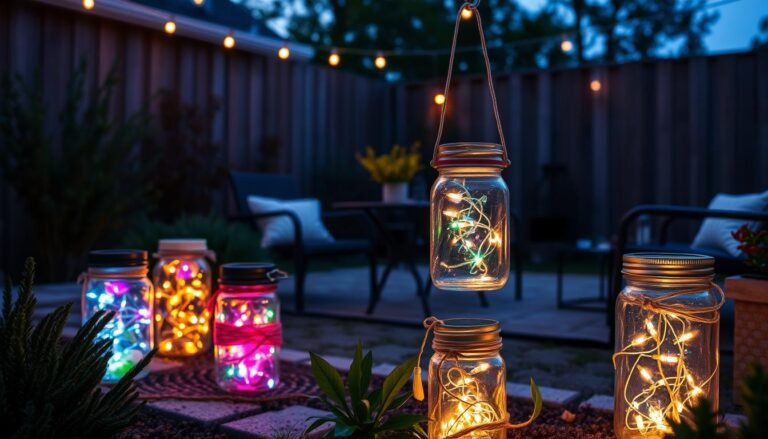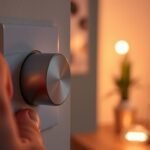Affiliate Disclosure: This post may contain affiliate links. If you make a purchase, we may earn a small commission at no extra cost to you.
Ever sat in a dim room and seen the lights start to flicker?
It can be quite spooky, making you wonder why it’s happening.
Flickering lights are a common issue due to various problems. These include loose connections and power supply troubles.
As a homeowner, I’ve dealt with flickering lights. It’s not easy to find the cause, but don’t worry.
Why do lights flicker?
In this article, we’ll look at the main reasons for flickering lights. We’ll also see how to solve the problem.
So, get ready with a flashlight, and let’s understand this common mystery.

Key Takeaways
- Flickering lights can be caused by various electrical issues, from loose connections to power supply problems.
- Common causes include dimmer and downlight incompatibility, the ripple effect from electricity load control, loose bulb connections, and dirty light sockets.
- Electrical wiring problems, high-wattage appliance usage, and voltage fluctuations can also lead to flickering lights.
- Using the wrong type of bulb with a dimmer switch can contribute to the problem.
- Alternative solutions like solar-powered lights and ripple signal filters can help reduce flickering issues.
Check out our FREE Calculators on our Resources Page
Common Reasons for Flickering Lights
Flickering lights can be annoying, but they often have simple causes.
For one, there’s downlight and dimmer incompatibility. You might see flickering if you use old dimmers meant for halogen lights with new LED downlights. To fix this, make sure your dimmer and downlights match. It’s best if they’re from the same brand.
The ripple effect from electricity load control is another reason for flickering. Utility companies sometimes use this method to handle high power needs. This can make LED lights flicker. But, you can reduce this by fitting ripple signal filters.
Even small issues like loose bulb connections or dusty, dirty sockets can cause flickering. Just tighten the bulbs and clean the sockets to make the lights steady again.
Electrical Wiring Issues Causing Flickering
Flickering lights often signal trouble with the home’s electrical wiring. This happens when wiring is loose or outdated, usually in older houses. Another cause could be faulty light switches, either wired wrong or getting worn.
If simply cleaning the sockets or tightening the bulbs doesn’t help, call an electrician. They can check the home’s electrical system and do any needed repairs or upgrades to stop the flickering.
Loose or Outdated Electrical Wiring
In older homes, electrical wiring might get loose or outdated, leading to flickering. This might be more noticeable after home renovations that changed the electrical setup.
Getting an electrician to look at the condition of your home’s wiring is a smart move. They can make the required upgrades to stop the flickering from these issues.
Faulty Light Switches
Don’t forget faulty light switches as another reason for flickering lights. When these switches are not wired right or are old, they can mess with the electricity. A simple fix might be just replacing the problematic light switches. This can often solve the flickering in your home.
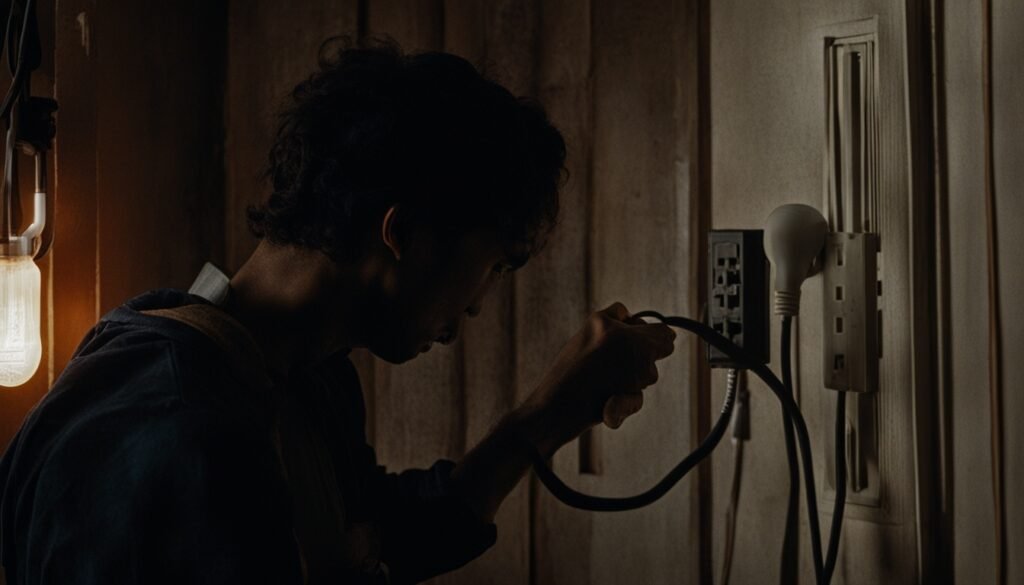
why do lights flicker When Turning On Appliances?
Turning on big, high-wattage home appliances can cause your lights to flicker. Appliances like stoves, air conditioners, or washers need a big burst of electricity at first. This is called an inrush current. The sudden need for a lot of power can drop the voltage, making your lights flicker or dim briefly.
Inrush Current from High-Wattage Appliances
Starting up these powerful appliances pulls a lot of current at once. Known as inrush current, it causes a spike in electricity use. This can lower the voltage in your home for a bit. The effect is your lights might flicker or dim while they adjust to the changes.
Overloaded Circuits
If the appliances causing the power rush and your LED lights share the same circuit, your lights will flicker. This happens because the high demand for electricity by these devices can overload the circuit. This overload leads to the voltage dropping, making your lights flicker. To avoid this, create separate circuits for your big appliances.
At times, you might need to upgrade your home’s electrical panel. If it can’t keep up with the electricity needs of modern appliances, it might cause your lights to flicker.
To figure out the best solution, talking to a professional electrician is smart. They can advise whether you need separate circuits or a panel upgrade to stop the flickering.
Voltage Fluctuations Leading to Flickering
In your home, if voltage is not steady, lights might flicker. The right voltage range for your home (in the United States) is 115-125 volts. If the voltage is too high or low, lights can flicker, go dim, or bulbs may die early.
Use a voltmeter to check your home’s voltage readings. If the numbers are not right, there could be a problem. This issue might be with the electrical utility or it could be too much for your home’s electrical system. Talking to an electrician can help you find and fix these voltage problems, stopping the flickering lights.
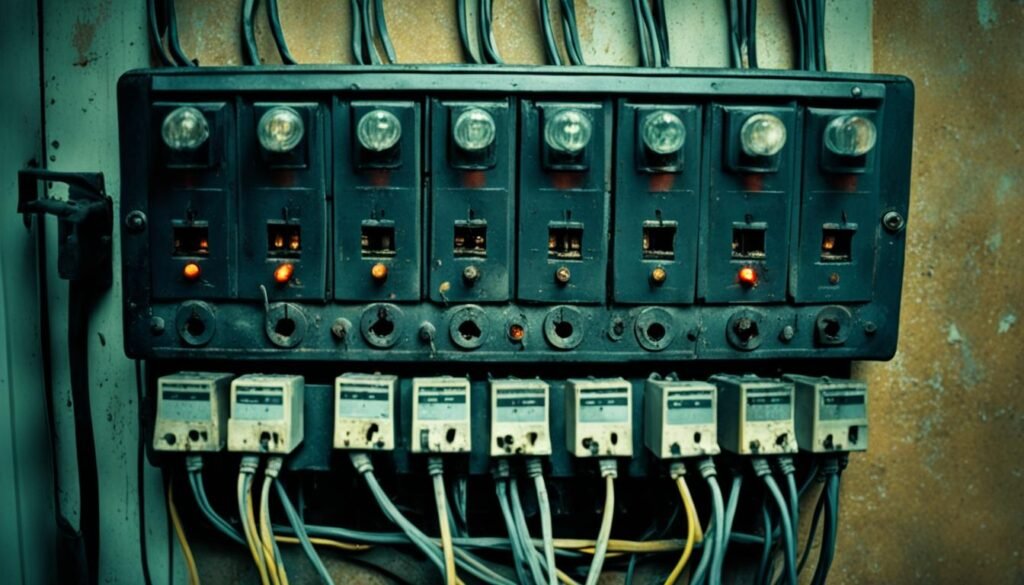
Incompatible Bulb Types and Dimmers
Flickering lights often happen when the wrong bulb is used with a dimmer. Old-style incandescent bulbs work well with dimmers because they are “persistent.” This means they handle quick power changes from the dimmer smoothly. But LED and CFL bulbs turn on and off faster. So, they might flicker if used with the wrong dimmer.
Using Non-Dimmable Bulbs with Dimmers
To solve this problem, make sure you use dimmable LED or CFL bulbs with your dimmer switches. Other bulbs that aren’t made for dimming, known as non-dimmable, can flicker. It’s key to ensure your bulb and LED dimmer match to avoid flickering. This simple step can make your dimmable lights work without any flicker.

Reducing Flickering with Alternative Solutions
Are you sick of flickering lights due to grid issues like the ripple effect from load control? There are other options to try. You can cut your reliance on the grid to avoid these annoying flickering lights.
Using Solar-Powered Lights
Switching to solar-powered lights is a great fix. These lights use the sun’s energy. They’re not bothered by grid problems. So, you get a steady light source that won’t flicker.
Installing Ripple Signal Filters
To stop flickering lights, consider a . An electrician can put this on your meter box. It deals with the ripple problem. This makes your lights more reliable and stable.

When to Call an Electrician for Flickering Lights
If you’ve tried simple fixes like cleaning light sockets, and bulbs still flicker, it’s time to call an electrician. They are skilled to deal with complex and risky electrical issues. A trained expert can figure out and fix faulty wiring, switches, or voltage spikes.
They’ll check if your home’s electrical system needs an upgrade to stop the flickering. With their knowledge, they’ll carry out a full inspection of your electrical system. This helps catch any problems causing the lights to flicker.
Always wear the right personal protective equipment when an electrician is working. Safety glasses, gloves, and proper clothing are essential. Since electrical work is dangerous, playing it safe is a must. Leave the job to those who are trained for it.
FAQ
What are the common reasons for flickering lights?
How can electrical wiring issues cause flickering lights?
Why do lights flicker when turning on appliances?
How can voltage fluctuations lead to flickering lights?
What issues can incompatible bulb types and dimmers cause?
What alternative solutions can help reduce flickering lights?
When should you call an electrician for flickering lights?
Check out our FREE Calculators on our Resources Page
Source Links
- https://thelightingoutlet.com.au/blogs/news/top-reasons-why-your-led-lights-keep-flickering
- https://www.thespruce.com/why-is-my-light-flickering-7483124

